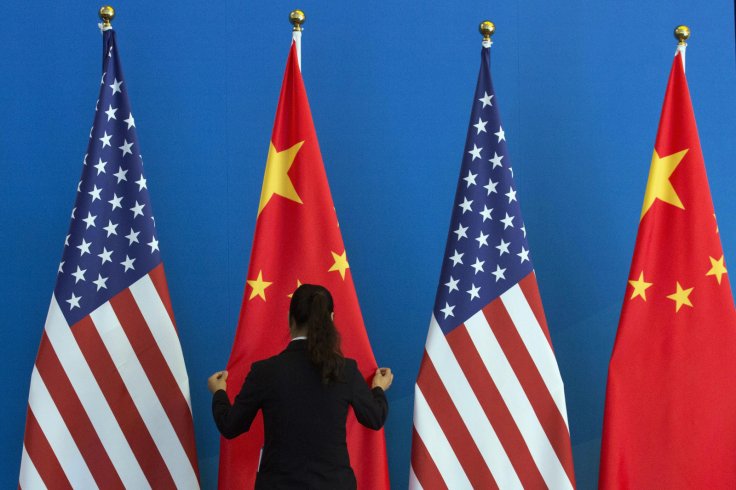Top generals in the United States are now alarmed over China's stunning military expansion. American defense officials foresee trouble on multiple fronts as China is rapidly modernizing its military.
U.S. officials are alarmed by the pace of Beijing's technological modernization in various domains, including its nuclear programme, cyber technology, missile capabilities and space programme. John Hyten, vice chairman of the Joint Chiefs of Staff General, said China's hypersonic missile advancements are an area of concern. He also warned that Beijing is on track to "surpass" America, according to the Associated Press.
"The pace at which China is moving is stunning," said General Hyten. Beijing represents a greater threat to U.S. dominance due to its economic resources and rampant military modernization, he said. "China will surpass Russia and the United States" in overall military power in the coming years "if we don't do something to change it," he added.

1. China Secretly Tested Nuclear-Capable Hypersonic Missile
China reportedly tested a nuclear-capable hypersonic missile in August in a bid to demonstrate its advanced space capability that took U.S. intelligence by surprise, according to a Financial Times report. The report stated that a Long March rocket was launched in Beijing in August when it circled the globe at low orbit before descending toward its target, and missing it by over 20 miles.
China, on the other hand, denied the report, insisting that it was a routine space vehicle and not an addition to its air weaponry.
According to General Mark Milley, chairman of the Joint Chiefs of Staff, the missile test was "very close" to being a Sputnik moment and called the development very "concerning."
2. China Completed Hundreds of Hypersonic Missile Tests While US Has Done Just 9
Speaking at a Defense Writers Group roundtable, General Hyten said China's hypersonic missile advancements is an area of concern. The U.S. has done nine hypersonic missile tests during the past five years, while China has done hundreds, Hyten said, echoing previous concerns by top military brass.
"What you need to be worried about is that in the last five years, or maybe longer, the United States has done nine hypersonic missile tests, and in the same time the Chinese have done hundreds,"Hyten said, according to reports.
"Single digits versus hundreds is not a good place."
3. China Appears to Have About 250 ICBM Silos Under Construction
U.S. researchers are also concerned as China appears to be expanding its nuclear capabilities via land-based intercontinental missile systems (ICBMs).
Identified via satellite imagery, China appears to have about 250 ICBM silos under construction, which is more than 10 times the number in operation today. Hans Kristensen, a nuclear weapons expert at the Federation of American Scientists, told the Associated Press that the U.S. military, by comparison has 400 active ICBM silos and 50 in reserve.
4. Shijian-21: China Launches Anti-Satellite 'Weapon' into Space
Beijing launched Shijian-21 satellite on October 24, atop a Long March-3B carrier rocket from Xichang Satellite Launch Center in Southwest China. Experts in U.S. have expressed concerns over this development as the new satellite can be used as a weapon capable of grabbing and crushing American satellites.
In April 2021, the commander of the U.S. Space Command, Air Force Gen. James Dickinson told Congress that spacecraft like the Shijian-21 is part of an effort by China to seek "space superiority through space and space-attack systems." He was concerned about China's ability to destroy other nations' satellites.
5. Taiwan: A Trigger for a Potentially Disastrous U.S.-China War
As reported by AP, Taiwan has also emerged as a big worry for the U.S. as President Joe Biden said the U.S. would defend Taiwan if China attacked, in an apparent departure from a long-held U.S. foreign policy position.
On Sunday, tensions spiked as Chinese foreign minister Wang Yi told the U.S. not to "betray its promises" on Taiwan at a rare meeting with secretary of state Antony Blinken.
A senior state department official told Reuters that Blinken assured Wang that there has been no change in the US's "One China" policy, which means it only maintains formal diplomatic relations with Beijing and not Taipei.
China said Taiwan has crossed the line as President Tsai Ing-wen for the first time acknowledged the presence of American troops on Taiwanese soil for training purposes.
"Regardless of the purpose, the fact that U.S. troops are stationed in Taiwan has crossed the bottom line. It is one of the most dangerous factors that could trigger a war in the Taiwan Straits," said a Global Times piece. While Taiwan is an ally of the United States, this extended military support and strategic assistance stands at risk of infuriating China.
Such rapid developments have prompted the Biden administration to attempt to reorient its policies to avoid a shift in the global balance of power.









